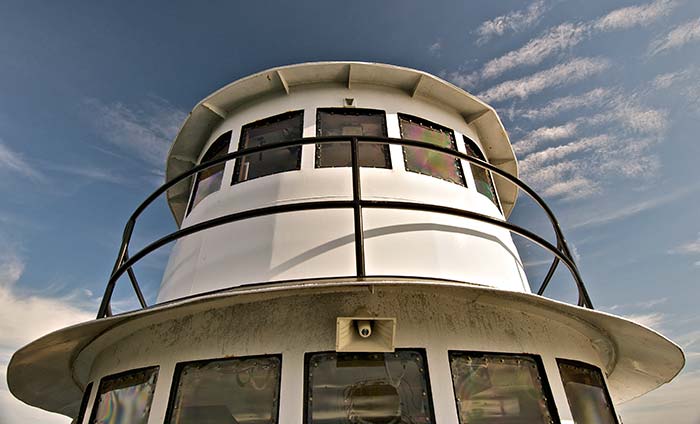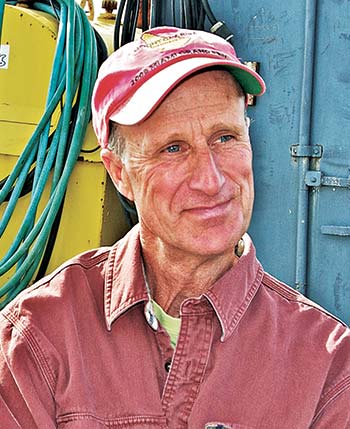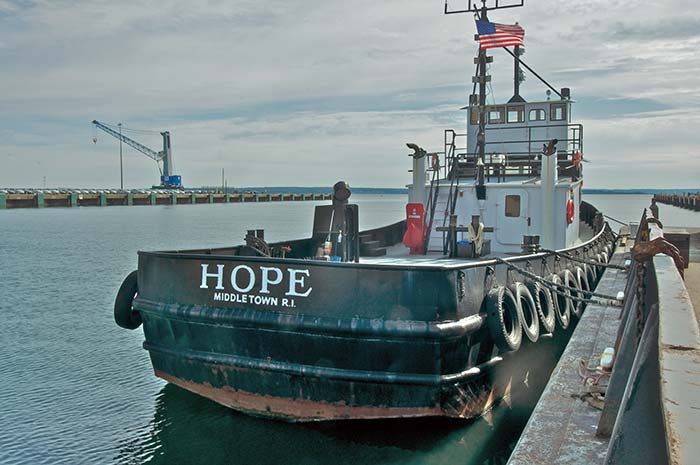Advertisement
Knowledge of the rules of the road is critical. But so is common sense, opines this member, who's also a professional mariner.

All the rules in the book, and a captain with the highest professional standards, can't stop a barge, ship — or the tug Hope — once it's too late. (Photo: Douglas Bernon)
I'm a boat owner, captain of an 80-foot tugboat, and I work all over New England. While pushing a 130-foot crane barge in Rhode Island a while back, I came upon a sailing class about a half-mile outside Newport Harbor. I was born and raised in Newport, spent most of my life on the waterfront, and this has always been a pleasant sight for me.
So what happened next came as a surprise.

Capt. Oatway operates the tug Hope in New England. (Photo:
Douglas Bernon)
There were six 16-foot sailboats, and one tender with two instructors aboard. It was a beautiful summer day with plenty of boat traffic, and 10 knots of wind — perfect conditions. The sailboats were stopped, either taking a break or between races. After giving the standard security call on the VHF stating my destination, I turned to port, as there was more and larger traffic to starboard. This put the class to starboard. When we were 300 yards off, one of the sailboats broke from the pack, turned toward my course, and started across my bow. I slowed further and turned to starboard to avoid him, turning "early and obvious" as tug operators like to say.
But at 200 yards, the same sailboat turned and headed across my bow again. I slowed even more and turned away a second time. At 100 yards off, the boat turned again and proceeded across my bow for a third time! At this point, I had to go into full reverse.
By the time I stopped my 700-ton tug and barge, the class was 75 feet off my port side. The youngster on the rebel boat gave me the one-finger salute, and yelled that he'd had the right of way. My crew of four stood on the barge deck in disbelief.
Now, I've passed many of these classes in my 40-plus years on the water. I've even seen instructor boats get between my tow and the class, as a mother hen would do to protect her chicks. I have a lot of respect for these instructors, their skill, and the responsibility they carry. I'm confident right of way is taught by instructors in these classes. But I wonder if we impart enough common sense when we teach the rules of the road.

The tug Hope. (Photo: Douglas Bernon)
Tugboat captains are professional mariners and held to the strictest U.S. Coast Guard rules and guidelines. Because of recent upgraded regulations, tugs are now as well-equipped as larger ships, and the captains are held to an even higher standard than in the past. But all the rules in the book and a captain with the highest professional standards can't stop a barge or ship once it's too late.
I'd like to offer my professional advice to all boat operators and to schools teaching boat operation to young and old alike, in hopes that a tragedy may be avoided: Please teach waterway rules with common sense applied; never assume the other vessel sees you, knows the same rules, or cares; turn "early and obvious" so everyone is clear about your intent; and have fun with this wonderful sport, as it's one you can enjoy for the rest of your life.
